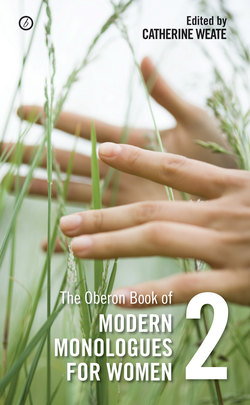Читать книгу The Oberon Book of Modern Monologues for Women: Volume Two - Catherine Weate - Страница 6
На сайте Литреса книга снята с продажи.
INTRODUCTION
ОглавлениеMonologues are an essential part of every actor’s toolkit. Why? Because actors are required to perform monologues regularly throughout their career: in particular, preparing for drama school entry, showcasing skills for agents or auditioning for a professional role. But what actually is a monologue? And how do you go about choosing the right one for you?
A monologue is nothing more than a speech by a single character in a play or screenplay. Sometimes the character might speak their thoughts aloud to themselves, sometimes they might engage in a lengthy speech to another character and sometimes they will directly address the audience, breaking down the ‘fourth wall’.
Choosing a monologue, however, is a delicate task. The only givens are that the character should be close to your age (or in your playing range) and the text should be sufficiently interesting (on its own without the rest of the play) to hold the attention of an audience. Most importantly, it must speak to you, resonate with your inner emotions, affect your senses, make you laugh or cry and draw you into a world that you want to hear more about. But don’t forget that if you are using the monologue in a professional audition then it must resemble the job in some way, through genre, period, culture and/or character (including accent).
Some coaches have particular ‘rules’ for choosing a monologue. Let me assure you that there is no ‘right’ or ‘wrong’. Trust your inner instincts when making your choice, as long as the piece is appropriate for the context in which it is to be performed. There are coaches who advise avoiding monologues that are: physically still, tell a story about the past, directly address the audience or use vulgarity. None of these rules apply (unless stipulated by an audition panel or casting agent). Controversial content is tricky to avoid in contemporary theatre texts (after all, modern plays often seek to mirror the real world), and a well-written character-driven story spoken directly to an audience can be riveting.
Other coaches advise actors to avoid monologue books; however, they can be a terrifically useful tool and a great starting point. Better than being overwhelmed by rows of plays in bookshops or libraries. They only work though if you read the full play text from which your monologue has been drawn. Picking a piece from a book and performing it without further reading or research is madness and, ultimately, your character study will be superficial and incomplete. Read the play to understand the journey/trajectory of plot, character, relationship and situation. If possible, try to see the play in performance to understand how the monologue (and therefore the character) works in context.
This monologue book showcases the writing from authors published by Oberon Books (following on from the first volume of The Oberon Book of Modern Monologues for Women, published in 2008). There are a diverse range of quirky and memorable characters that cross cultural and historical boundaries. Yes, some of them tell stories, many directly address the audience and, being contemporary plays, there is quite a bit of controversial material. As there should be.
The pieces have been organised into age-specific groups: ‘teens’, ‘twenties’, ‘thirties’ and ‘forties plus’. However, there is the occasional character that crosses these boundaries so do spend some time reading outside of your age-related box just in case. The boundaries are simply there to provide you with a starting point.
Monologue length varies widely depending on the material: the concise and contained to the weighty and protracted. Don’t be afraid of adapting them to your needs, particularly when many auditions stipulate time frames for performance. In a few cases I have cut texts to maintain flow and sense. This is indicated by ‘…’ on a line all of its own, between paragraphs.
If you require any further information or advice on these books (all feedback is welcome) or in choosing/performing a monologue then please contact me through my website (www.catherineweate.com) or on twitter (@voicesupport). In the meantime, happy reading.
Catherine Weate
